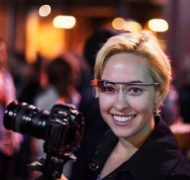Selfie or Selfless: Can Technology Be a Spiritual Aid?
Blog / Produced by The High Calling
To borrow from that august authority, the online comments section: it’s either the end of the world or it’s not. We speak, of course, of the technology we live by—the dings, screens, glows, cursors, pixels, and the 1s and 0s driving both the designs that bind and the unkindest bytes.
Do our laptops and handhelds, as MIT psychologist and prof Sherry Turkle puts it, “isolate us under the auspices of connection”? Is technology Evil with a charge cord? Or can it also be a spiritual aid? (And if so, how?)
The answer is easy: it depends.
And to support the equivocating, The High Calling presents a string of opinions from authorities as varied as philosopher Albert Borgmann and upcoming notable Bess Weatherby to filmmaker Booker T. Mattison and NYT mom blogger Kay Wyma.
We asked, “Can technology be used for spiritual good?” The experts responded:
“Information technology cannot be at the center of our lives . . .”
Dr. Albert Borgmann is a Regents Professor of Philosophy and author of “Technology and the Character of Contemporary Life,” “Crossing the Postmodern Divide,” “Real American Ethics,” and “Turn of the Millennium,” and, notably, a nice man. Since 1970, he’s taught at the University of Montana.
At times the most advanced technological achievements have centered spiritual life. Gothic cathedrals and baroque organs were astounding engineering feats and graced life and celebration.
Information technology is today’s defining achievement. Nothing so sophisticated and powerful has ever been accomplished. Hence enterprising Christians have tried to see it as the center of spiritual renewal. But the Internet typically infuses life with distraction and indolence.
Now what? Not admire and instead reject the Internet? Certainly not. Christians have to understand information technology. A crucial part of understanding is this: Information technology cannot be at the center of our lives, but it is an indispensable means and the inescapable backdrop of spiritual life. As a means it allows us to be available to each other, and as a backdrop it makes more radiant than ever those actual events when we make music and break the bread together.
“Perhaps I have a romantic notion even of pencils.”
Bess Weatherby, age 26 and erstwhile Manhattan nanny, is a NYC-based writer and editor.
A man phoned Luella Merrett Elementary when I was in the fifth grade and told the secretary there was a device in the school. A device, our teacher told us, could be anything man-made. He could be talking about a pencil. Of course, we evacuated anyway.
During the three-hour recess that followed, I remember thinking about all the devices man had made—bombs, guns, computers—and wondering if we should have stopped at pencils.
I felt very philosophical.
It’s a knee-jerk reaction now, this wariness of technology. I wonder if the progress from the pencil to the iPad is actually progress. Everything man-made is corrupted by our nature. How could God use it?
So perhaps I have a romantic notion even of pencils.
But then again, perhaps my notion of God is romantic. I have no qualms thinking of the things he made—the star, the ever-burning flames, the rainbow. What is troubling are the things we made and he touched—the tables he overturned, the sandals he washed, the nails a Roman citizen pounded into his palms.
It’s simpler to assert God would not work through an iPad, rather than acknowledge he once wrote laws on a tablet. The former costs us nothing to believe; the latter demands a response.
“Technology has enabled us to communicate with one another quickly, but I sometimes wonder if it has not done so too cheaply.”
Dr. James Patrick’s books on history, architecture and theology include Madgalen Metaphysicals: Orthodoxy and Idealism at Oxford, 1901-1945 and The Beginning of Collegiate Education West of the Appalachians. Among many things, he was a founder of The College of St. Thomas More in Ft. Worth and currently is senior fellow at The Walsingham Society in Dallas.
I am agnostic regarding the relation between the internet and the spiritual life. By its nature impersonal, abstractive, and utilitarian, the internet tends to make its best showing in tasks that are utilitarian. But what is it that a person undertakes that is properly merely utilitarian?
The timesaving characteristic of the Internet may or may not have spiritual implications. Its dreadful comprehensiveness probably does not. But in the haystack of possibility—one click to porn, another to Mother Angelica—there is one spiritual gift the Internet encourages. While it can foster a dreadful superficiality (How many friends do you have on Facebook?), it can reach out to touch and speak to that one person who truly is a friend, who might be lost forever in the move to Seattle. If friendship is the first flower of charity, the Internet has its spiritual uses.
Technology has enabled us to communicate with one another quickly, but I sometimes wonder if it has not done so too cheaply. On its own, the internet had not created much that is beautiful or true, but it has enabled us to rush past such considerations, contributing to a fatal superficiality in which the wisdom of Garrison Keeler is high philosophy.
“ . . . you can access and read the Word of God anywhere.”
Booker T. Mattison wrote and directed the film adaptation of Zora Neale Hurston's classic "The Gilded Six Bits,” on Showtime. His MFA in film is from NYU, and his novel, Snitch, received a starred review in Publishers Weekly. He’s taught literary criticism at NY’s College of New Rochelle, film production at Brooklyn College and advanced directing, screenwriting and directing actors at Regent University in Virginia.
Google is the most powerful Bible search engine in the history of humankind. This profound technological advancement has sprung up in an age where biblical illiteracy is increasingly the norm. Coincidence? Or is the God of technology using it for His glory?
You see, with Google searches you can know only a few words or completely butcher a passage of scripture, yet more often than not, still find the verse in your search results. Add the ubiquity of Wi Fi and 4G connectivity and so long as you have a smart phone, laptop or tablet you can access and read the word of God anywhere, anytime—and locate the specific verses that are relevant to your situation.
Never before in the history of Creation has the Bible and its contents been so accessible—and searchable. And that’s a good thing.
“ . . . we block those important spiritual moments of pain and suffering.”
Andy Braner is an actor, author, Camp Kivu founder/director, and convention shaker. On that last note, the last two summers, his Christian camp in the Colorado mountains has hosted a contingent of Jordanian/Muslim teens in what The Daily Beast called his “jet-ski diplomacy”—exerting themselves together first outdoors and then in close and frank conversation.
Online, at every turn are places where we can be in control. From texts we ‘lost’ to the emails we ‘didn't receive’ we can line up ideas to suit ourselves. Yet in an environment controlled for comfort, we block those important spiritual moments of pain and suffering.
And true spiritual development, at its core, must be with people, not with a screen. You can't make a screen angry.
Yes, certain celebrity pastors can reach the four corners of the earth. Yes, more people have access to teaching than ever before in human history. But without a small close tie of community, faith becomes more of a spectator sport than a lifestyle change.
“It can be hard to stay on course.”
Kay Wyma was an MBA, on a White House advance team, then a wife. Then she was a mother of six turned blogger, with regular appearances as a NYT blogger. She’s also author of Cleaning House: A Mom’s Twelve-Month Experiment to Rid Her Home of Youth Entitlement.
Be it max-750-word articles, three-minute videos, limit 140-character quips and likeable pics instantly ‘grammed to onlookers—these things can munch through the hours with no regard to productivity. And it can be hard to stay on course.
So, is technology all bad? No.
See also: thought-provoking and action-inducing articles; invitations to keep up with new, old and long-lost friends; poignant blog posts, inspiring human interest stories, family-friendly entertainment, and more.
Not only is technology not all bad, it just might be the unlikely catalyst to true spirituality. Worn out by constantly shifting sands, travelers earnestly seeking peace find True spirituality. Stability. Sanctuary. Acceptance. The One who is “the same yesterday, today and tomorrow.”
Authentic spirituality: the yang to technology’s yin.
“ . . . we are one unified body of Christ—and social networking is an amazing way to say connected.”
Matthew Henry is LeTourneau University’s Dean of Innovative Education. Some title. He’s also leader of LeTourneau’s new Center for Innovative Learning and Education—all about online, on-ground, or any kind of hybrid instruction or learning.
Christ calls us to unity, but we’re so denominationally bent that we forget that across the entire planet we are one unified body of Christ—and social networking is an amazing way to stay connected, even just email, to unite that body of Christ.
To take it a tad further, I’m connected to more people now than I’ve been in 10 or 15 years, and it’s these social networking proliferates. . . . I’ve reconnected with friends and colleagues, and I’m praying for them, or maybe someone has a death in the family. Those kinds of things have been enabled in an amazing way. That’s the unity of the body of Christ that God calls us to.
When Paul was writing in Ephesians 4—one Spirit, one baptism . . . we can do that greater than any other time in history. It’s a privilege of living in this age.
“We have a great need for connection and community that isn’t filled in one meeting a week at church.”
Travis Gates is a seminary-educated entrepreneur and digital strategist working with organizations such as Apple as well as key non-profits and technology start-ups around the world.
We have a great need for connection and community that isn’t filled in one meeting a week at church. Technology can narrow the gap to stay connected wherever we go and to develop community around simple things—like Facebook.
You read, ‘Please pray for my neighbors, their house burned down and they have nothing.’ Suddenly, through the Church and your Christian friends, people not only pray—they show up at the door and take care of the neighbors. That’s real continuity.
Also, the discipline to stay in the Word and pray can be found by using some simple tools. Just like managing our budget, there are tools to manage our time to sit down for 30 minutes and read a devotion, to go through a reading plan. We can do [challenges and community-building] with scripture, devotions, testimonies, that help people during the week when they’re not at church service. That’s discipleship and community.
“A powerful tool or your worst enemy.”
Michael Conrad has lived and worked in Spain and Cambodia, he wins fiddle championships and, for Lovell-Fairchild Communications, he heads media relations and social media.
A couple years ago I had the great honor of meeting Truett Cathy, founder of Chick-fil-A. He's synonymous with wealth and generosity, an unusual combination, and perhaps more notably, he’s known for his Christian faith. How many times have I driven into a Chick-fil-A parking lot on Sunday only to find . . . yep, you know. But in the few short moments I had with him, Mr. Cathy said something that stuck with me: "Money can be a powerful tool or it can be your worst enemy."
Why bring up that bit of wisdom and not something else? Because it's what he'd learned firsthand.
Technology is what I know has great potential for good—to grow in your walk with Jesus and encourage others to do the same. But as with everything, it can be tainted. It can be ruined.
Technology is a powerful tool or your worst enemy.
EDITOR’S NOTE: All week on The High Calling, we’re focusing on God and Technology. Do you wonder how to stay focused on God in the age of screens? Join us each day this week for articles and reflections on serving God in a world of technology. Do you know someone who loves technology? Invite them to consider a Christian perspective on technology by sharing one of this week’s articles via email or social media.
Image by Brian Ingram. Used with permission. Sourced via Flickr.











